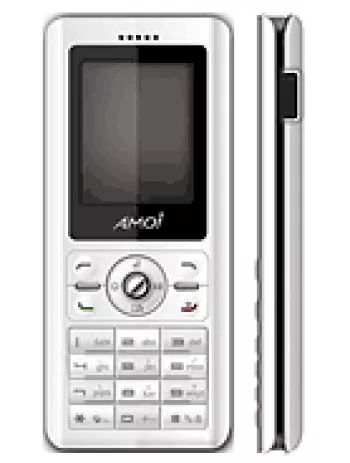
Overview of Amoi M33
The Amoi M33 was a feature phone, announced in the third quarter of 2007, but it never made it to market as it was eventually cancelled. Despite its cancellation, it offers an interesting glimpse into mobile technology trends of the mid-2000s, with a modest set of features that were characteristic of low-end phones during that period. With a compact design and basic functionality, the Amoi M33 aimed to appeal to users seeking simplicity and affordability.
Design and Build
The Amoi M33 features a minimalist design typical of its era. It has dimensions of 106 x 45 x 10.5 mm, providing a small, portable frame that fits easily in the hand or pocket. The phone is constructed with a silver-colored body, which gives it a sleek and understated look. It sports a Mini-SIM slot, maintaining the traditional features of early mobile phones.
Display
The phone is equipped with a 1.8-inch CSTN display with 65K colors. Although small by today's standards, the screen was sufficient for basic navigation and functionality. Its 128 x 160 pixel resolution, with a pixel density of approximately 114 ppi, reflects the lower visual demands of non-smartphones at the time.
Camera Capabilities
In terms of camera capabilities, the Amoi M33 is equipped with a VGA camera. This 0.3MP camera offered basic photographic functionality, suitable for casual snapshots. However, it doesn't support video recording, which was a common limitation among entry-level phones in the late 2000s.
Memory and Storage
With an internal storage capacity of 30MB, the Amoi M33 provided limited space for storing contacts, messages, and small files. Users could maintain a phonebook with up to 500 entries and keep a record of 20 dialed, received, and missed calls each. The phone includes a microSD slot for expandable memory, addressing users' needs for additional storage.
Network and Connectivity
Connectivity options on the Amoi M33 were basic, in line with its status as a feature phone. It supported GSM 900/1800 bands, making it suitable for voice calls and text messaging. However, there were no data connectivity technologies such as GPRS or EDGE available, which means no internet browsing capabilities. The device also lacked Bluetooth and USB connectivity, though it featured an FM radio, providing a means of entertainment and information.
Sound and Audio
Sound options on the Amoi M33 included vibration alerts and downloadable polyphonic or MP3 ringtones, though it lacked a loudspeaker and a 3.5mm audio jack. This meant users had limited options for audio output, aligning with the phone's no-frills approach.
Battery Life
The Amoi M33 was powered by a removable Li-Ion 700mAh battery. This battery size was typical for feature phones of the time, offering reasonable standby and talk time given the phone’s lack of power-intensive applications.
Additional Features
In terms of additional features, the Amoi M33 was equipped with basic SMS messaging support. While it included games for entertainment, it did not support Java-based applications or web browsers. The device was designed to cater to users who prioritized traditional phone capabilities over modern smartphone functionalities.
Conclusion
The Amoi M33 highlights the transitional phase of mobile phones from basic communication devices to more sophisticated smartphones. Its simple design, essential feature set, and low cost likely would have appealed to consumers seeking an uncomplicated mobile experience. While it never reached the market, the M33 serves as a reminder of the rapidly evolving tech landscape and the varied consumer needs in mobile communication during the 2000s.
Key Features of Amoi M33
- Compact dimensions: 106 x 45 x 10.5 mm
- Support for GSM 900/1800 bands
- CSTN display with 65K colors
- Expandable storage using microSD card
- Phonebook capacity of up to 500 entries
- FM radio support
- Vibration and downloadable polyphonic, MP3 ringtones
- Removable Li-Ion 700 mAh battery
- Available in silver color
Disadvantages of Amoi M33
- Limited to GSM 2G bands only.
- No GPRS or EDGE support for data connectivity.
- The device was announced but ultimately cancelled.
- Utilizes a CSTN display with only 65K colors, which is outdated by current standards.
- Very small display size with low screen-to-body ratio.
- Low resolution with only ~114 ppi pixel density.
- VGA main camera with no video recording capability.
- No selfie camera is available.
- No loudspeaker available, limiting sound output options.
- Lack of a 3.5mm headphone jack for audio output.
- No support for WLAN, Bluetooth, or GPS connectivity.
- No USB connectivity option, limiting data transfer capabilities.
- Limited to SMS messaging only, with no web browser support.
- Does not support Java applications, restricting software expansion.
- Removable 700 mAh battery is relatively low capacity by modern standards.
View Also
More Phones
All Rights Reserved +13675 Phones © Mobilawy 2025
























